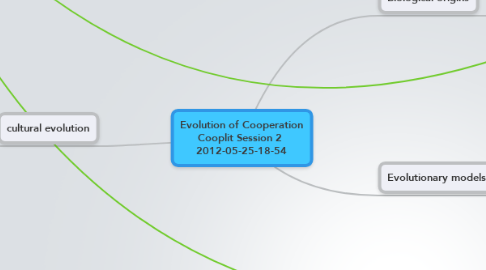
1. cultural evolution
1.1. social grooming
1.1.1. investing in strengthening bonds
1.1.2. Dunbar's limit
1.1.2.1. reputation as a work around for Dunbar's limit
1.1.3. evolutionary function of gossip
1.1.3.1. cognitive costs/limits on creating and maintaining group ties
1.2. shadow of the future
1.2.1. markers of trust
1.2.1.1. cultural differences
1.2.2. Ed Schein re definitions of trust
1.3. Learning
1.3.1. reprogramming culture
1.3.1.1. plasticity
1.3.1.2. equipped for social learning
1.3.1.3. only species that looks where others point for us
1.3.1.4. passing ideas along without the use of genetic material
1.3.2. radically different time scale than genetic evolution
1.3.2.1. shift in driving force away from biology to culture
1.3.2.2. what will be the evolutionary impact of the internet
1.3.3. learning/biology interaction
1.3.3.1. cooking food has advantages to those better equipped to digest it
1.3.3.2. lactose tolerance correlates to those who domesticated cattle
2. Biological origins
2.1. "pre-biological"
2.1.1. cooperation pre life
2.1.2. autocatalytic reactions
2.2. cellular
2.3. primates
3. Evolutionary models
3.1. Nowak - Mechanisms
3.1.1. Selection
3.1.1.1. Kin
3.1.1.2. Group
3.1.1.3. Spatial
3.1.2. Reciprocity
3.1.2.1. Direct
3.1.2.1.1. why vampire bats cooperate
3.1.2.2. Indirect
3.1.2.2.1. reputation
3.1.2.2.2. history
3.2. Darwinian explanations
3.2.1. relate to "survival of the fittest"
3.3. Axelrod
3.3.1. advantages to cooperation
3.3.2. tit for tat dominates
3.3.2.1. simple improvements work
3.3.2.2. complex strategies are brittle
